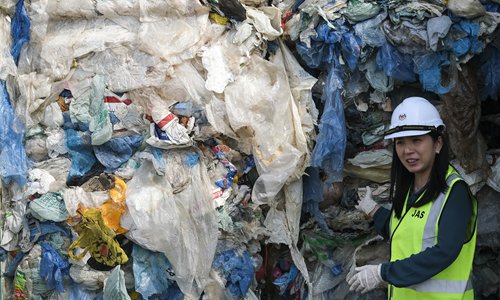HOME >> OPINION
East and waste do not go together
By Kathleen Naday Source:Global Times Published: 2019/6/3 18:23:39

Photo: VCG
At home in the UK recently, in my mother's house, we assiduously separated her household trash into recyclable and non-recyclable, washed out the cans and took the caps off the plastic bottles, congratulating ourselves that we were doing our bit for the environment, as we tipped the trash into the special blue recycling bins the local council provides to each household. I even took some old cellphones and spectacles back from China, because I knew I could take them to charity shops, who could recycle them for money.
But it turns out all is not well in the rotting kingdom (not a metaphor for Brexit). It seems that much of the solid waste put out for recycling is not being recycled. Either because waste companies are not doing their jobs properly, or they are overwhelmed by the amount of trash, or because consumers are not sorting out garbage properly. Non-recyclables, tossed carelessly in with the recyclables makes the whole lot useless. And this poorly sorted garbage has apparently been finding its way to Asia.
Now countries are starting to kick out their foreign trash mountains. The Philippines has been in dispute with Canada for five years over 69 containers of what they say is 1,500 tons of contaminated trash - useless for recycling. The issue caused a diplomatic spat, which has now culminated in Ottawa agreeing to take back the household waste - originally said to be plastics for recycling. Authorities in Malaysia said they would no longer accept imports of waste, after tons of trash was found to be illegally flooding the country. Malaysian Environment Minister Yeo Bee Yin told media that Malaysia is not the "dumping ground of the world."
Even in China, where imports of plastic waste from overseas have dropped to almost zero, other forms of illegal waste have been imported. On May 22, customs authorities at Dalian port, Liaoning Province, sent back over 688 tons of smuggled aluminum waste, believed to have come from Australia, CGTN reported.
For years, European nations, the US and Australia, have been deflecting their waste problems onto others. China's decision to stop accepting certain categories of solid waste, particularly plastics, is laudable. According to the National Geographic, since 1992, China has taken in 45 percent of the world's trash. In 2016, Japan was the biggest supplier of plastic waste imports, followed by the US. However, much of the trash China took in also came from countries in the region - followed by Germany, Belgium and surprisingly, the Philippines itself. Other middle-income countries, such as Vietnam, Indonesia and Malaysia, exported more waste in 2016 to China than did the UK or Spain.
Earlier, China's developing industries could use the raw materials, which became an easy option for both companies and cities in the West to ship their waste away. The downside was that recycling technology remained undeveloped. But this changed in 2018 when China decided to receive no more trash. Global supply chains scrambled to find an alternative and Southeast Asian countries took up the slack.
Greenpeace, in a report focusing on Malaysia titled "The Recycling Myth" found unregulated dumping sites of imported "recycling" from all over the planet. There were Starbucks cups and cosmetics packaging. The waste came from the UK, the US, Canada, Australia, Sweden, Switzerland. Greenpeace investigators found plastic waste from 19 countries, the US being on top, followed by Japan. Much of this was burned in illegal factories.
Malaysia has announced that it will send back illegal trash.
Even before China's ban, the amount of plastic waste recycled globally was a mere 9 percent. The World Bank, in its 2018 report "What a Waste 2.0," forecast that global waste will increase some 70 percent in the next three decades.
According to a Yale University report, the US is struggling to deal with its garbage mountains. Some communities have stopped recycling programs and others are burning more waste or sending more to landfill. Australia is struggling to deal with its waste and in the UK, incineration rates have increased.
China has plans to make every community properly recycle and sort their garbage, but so far efficient recycling is sometime away.
Some experts are optimistic that the ban in Asian nations will lead to more investment in recycling technology. There is certainly appetite for this among consumers as people become more aware of plastic pollution.
The EU will ban single-use plastics by 2021. Some displaced Chinese recyclers have announced a move to the US. The Basel Convention, an international treaty on movement of waste across borders will be amended to ban contaminated and unrecyclable waste from being exported to developing nations without their permission. Other nations have strict bans on plastic bags - after Rwanda and Kenya enacted bans, Tanzania on Saturday became the latest to prohibit single-use plastic bags, warning that tourists must give them up before arrival in the country.
Some individual communities have managed to reduce waste and achieve high levels of recycling with low rates of contamination. Slovenian capital Ljubljana has achieved an impressive 68 percent recycling rate by introducing high tech plants to deal with trash, and by focusing on community efforts to deal with the issue.
Ljubljana isn't so big as London, New York or Shanghai, so efforts have to be scaled up immensely, and it will require a lot of education. But what the recent experience in Southeast Asia should show all of us is that we can't just decide to dump our trash on other people - they are already dealing with enough of their own. It is disheartening to think that the garbage you proudly separate in the UK could end up poisoning a river in Malaysia or Vietnam.
The author is a Beijing-based freelance writer who is doing postgraduate studies in sustainability at SOAS, University of London. opinion@globaltimes.com.cn
Posted in: VIEWPOINT